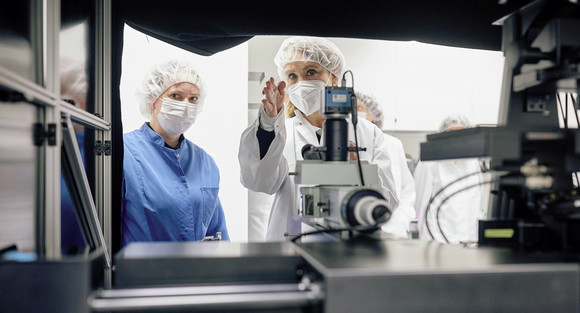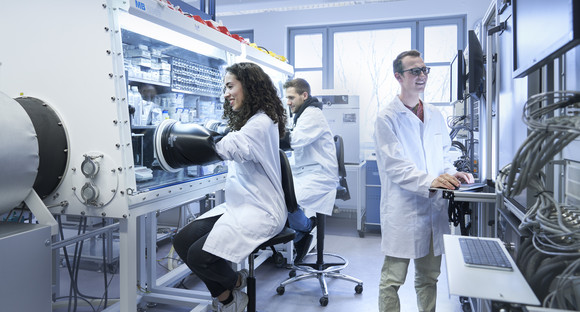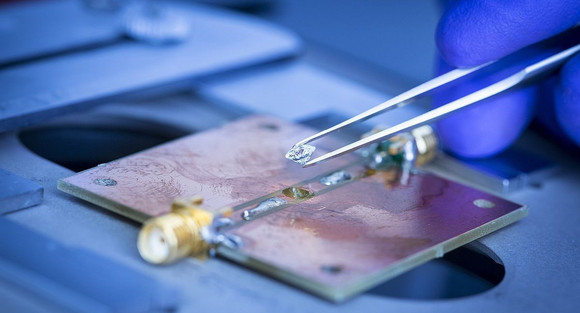Baden-Württemberg is the No. 1 research location in Europe, be it in artificial intelligence, the life sciences or engineering. With spending on research and development accounting for 5.7 percent of the gross domestic product in 2023, the German Southwest is the driver of innovation in Europe. Non-university and university research institutions work closely together and are linked through extensive networks. This ensures the rapid transfer of results from basic research via applied research into the development of new products and ideas.
The Ministry of Science, Research and Arts oversees all state universities, the majority of non-university research institutions as well as the scientific libraries and archives. At present, there are 50 public universities in Baden-Württemberg. In addition to public universities, the state is home to more than 100 research facilities, including 12 research institutions of the Max-Planck-Society, 20 facilities of the Fraunhofer-Society, 7 institutions of the Leibniz-Society, 2 major research centers of the Helmholtz Association and 3 sites of the German Aerospace Center (Deutsches Zentrum für Luft- und Raumfahrt). In a large variety of these facilities, the Ministry of Science, Research and Arts is involved in funding – either institution-wide or through individual research projects.
For those interested in start-up companies, Baden-Württemberg’s research institutions serve as a base for strong networks and advice while also being surrounded by plentiful capital and expertise. Baden-Württemberg's universities encourage students to be courageous enough to pursue their own ideas and dreams while providing the education and support for them to be successful.
Key Fields of Research
Baden-Württemberg focuses on research areas with a high potential for growth. With this goal in mind, the state has created campuses and ecosystems that enable high-level research together with close cooperation with local industry. Baden-Württemberg is particularly strong in the STEM subjects and in medicine, and these research areas are supported in our Innovation Campus Initiative.
Innovation Campus Initiative
Artificial intelligence (AI) is regarded as one of the most important innovation drivers for business and science in Baden-Württemberg.
With the Cyber Valley Innovation Campus in Stuttgart-Tübingen, Baden-Württemberg is certainly the most research-intensive location for Artificial Intelligence in Germany. In Cyber Valley, excellent AI-research meets business, attracting highly talented young professionals and encouraging start-ups.
The ongoing establishment of the ELLIS Institute (European Laboratory for Learning and Intelligent Systems) in Tübingen’s Cyber Valley will create a highly visible center in the international ELLIS network, where top researchers from all over Europe work together.
Just as it did in the past, Baden-Württemberg continues to play an active role in shaping the transformation and future of sustainable mobility. To this end, the Innovation Campus “Mobility of the Future” was founded as a cooperation between the University of Stuttgart and the Karlsruhe Institute of Technology (KIT).
This Innovation Campus aims to establish interdisciplinary and cross-location research collaborations to accelerate the development of emission-free mobility.
Cooperations with companies in Baden-Württemberg are strengthened through initiatives like the "Future Labs" and the "Innovation Challenge". A key element of the future labs are infrastructures that are used for academic research and for industrial applications. Those labs include the ARENA2036 in Stuttgart and the “Forschungsfabrik” (research factory) in Karlsruhe.
Healthcare is one of the main economic pillars in Baden-Württemberg, benefitting from the state’s high-performance research landscape. The "Forum Gesundheitsstandort Baden-Württemberg" (Health Forum for Baden-Württemberg) was founded to connect various research areas, the healthcare industry and healthcare services in order to make Baden-Württemberg one of the leading healthcare-locations in Germany and Europe.
The Innovation Campus Health + Life Science Alliance Heidelberg Mannheim brings together the expertise of university and non-university research institutions as well as university hospitals in the Rhine-Neckar region. The area around Heidelberg and Mannheim offers a unique environment for scientific institutions, companies and start-ups. In this ecosystem, the Innovation Campus conducts internationally visible cooperative and interdisciplinary research on widespread diseases, drugs or procedures for prevention, diagnostics and therapy. The use of Artificial intelligence also plays a large role, allowing for new insights to be gained from large data sets in the field.
High-performance quantum computers, ultrasensitive sensors or particularly precise MRI devices: Quantum technology offers enormous opportunities in key areas such as health, mobility and climate protection. As an important technology of the future, it is a driver of innovation and value creation in Baden-Württemberg. With the support of the state, global players from the industry have joined forces with universities and and non-university research institutions to form QuantumBW.
QuantumBW is based on a strong network in which state universities, non-university research institutions, leading high-tech companies and start-ups pool their expertise. Under this umbrella, innovative structures and measures are being created that will further develop Baden-Württemberg as a quantum hotspot and make its research even more visible internationally. This will also increase the attractiveness for highly qualified researchers and skilled workers. The density of excellent research institutions and leading companies in Baden-Württemberg is already high, especially in quantum sensor technology.
Through coordinated education and training in quantum technology, the expansion of high-performance infrastructures for research and development, and support for cooperative formats between science and industry, the state is creating the best conditions for turning research results and technical innovations into applications and leveraging the enormous potential of quantum technologies. The strategic goals and key fields in QuantumBW are summarized in the Quantum Strategy Baden-Württemberg, which also serves as a roadmap for development over the next ten years. The four fields of action are: Networking & Visibility, Cooperation Projects, Infrastructure, Spin-offs & Education and Training.
At the center of these activities is an office, funded by the Ministry of Science, Research and Arts and the Ministry of Economic Affairs, Labour and Tourism, which coordinates the implementation of the quantum strategy and promotes further networking of research and economic centers.
The Sustainability Innovation Campus (ICN) aims to establish the Upper Rhine region as a leading hub for sustainability research.
Under the theme “Transformations for Urban Regions of the Future – Climate Protection, Resource Conservation & Well-being”, researchers from the University of Freiburg and the Karlsruhe Institute of Technology (KIT) collaborate with a network of stakeholders from science, industry, politics, administration, and civil society to contribute to the sustainable transformation of society – taking into account economic aspects, the common good and social justice. The focus is on transdisciplinary collaboration and mutual knowledge exchange with society to foster system innovations.
The Sustainability Innovation Campus was launched in January 2024 with a kick-off event at the University of Freiburg.
Finances
In Baden-Württemberg's state budget, around 7.1 billion euros are earmarked for science, research and the arts (2026). The universities' third-party funding income in 2022 was around 1.2 billion euros. Added to this is third-party funding income from university medicine of just over 500 million euros.
Spendings on research and development accounted for 5.7 percent of gross domestic product in Baden-Württemberg in 2023 - well above the national average (3.1 percent) and the EU average (2.2 percent). The USA (3.5 percent), China (2.6 percent) and Japan (3.4 percent) also spent proportionately less on research and development. Only Israel invests significantly more (6.4 percent). Korea is about as strong, with a value of 5.0 percent.






